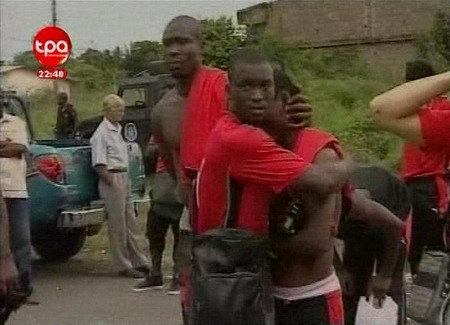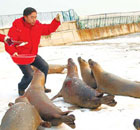Top News
Deadly ambush weighs on top Africa soccer event
(Agencies)
Updated: 2010-01-10 09:40
 |
Large Medium Small |
LUANDA: Africa's biggest soccer tournament starts in Angola on Sunday, overshadowed by an ambush on the Togo team bus that killed three people and wounded seven, prompting Togo to pull its team out of the competition.
|
 A video grab from Angolan TV shows players from Togo's national soccer squad comforting one another in Cabinda January 8, 2010, in this video grab obtained from Angolan TV January 9, 2010. Gunmen opened fire on a bus carrying Togo's national soccer squad to the top African tournament in Angola on Friday, killing the driver and wounding nine others, including two players, a Togo team official said. The bus had just entered the Angolan enclave of Cabinda, where separatists have waged a three-decade long war, when it came under heavy gunfire for several minutes, the official said. [Photo/Agencies]
|
The Angolan government has spent $1 billion building stadiums, roads and hotels for the competition, which brings together Africa's best national teams. The tournament, which lasts until Jan. 31, will be broadcast live round the world.
| ||||
The rebels of the Cabindan separatist group FLEC sprayed the Togolese bus with gunfire, killing the bus driver and wounding nine others. Two members of Togo's soccer delegation died on Saturday and one was undergoing surgery in South Africa.
A Togolese minister said the government was pulling the team out of the tournament because of "this dramatic situation". None of the other teams followed suit although some, including African champions Egypt, demanded tighter security.
Security analysts said the ambush showed how easily insurgents can grab world headlines with attacks on soft targets and embarrass countries by exposing lapses in security.
MORE SECURITY
Togolese officials named the dead men as media officer Stanislas Ocloo and assistant coach Amalete Abalo, and said reserve goalkeeper Kodjovi Obilale had been evacuated to Johannesburg where he underwent surgery.
Cabinda, the scene of FLEC attacks even after Angola's 27-year civil war ended in 2002, provides half the oil output of Angola, which rivals Nigeria as Africa's biggest producer.
It was the second militant attack on a sports team in less than a year. Last March, six policemen and a driver were killed when gunmen attacked a bus carrying Sri Lanka's cricket team in Pakistan.
Friday's assault raised questions about security for the soccer World Cup taking place in South Africa in June, but organisers of that event said it was nonsensical to draw comparisons. South Africa is the first African nation to hold the world's biggest single-sport event.
Chief World Cup organiser Danny Jordaan said the attack would have no impact on the World Cup. "It is nonsensical for South Africa to be tainted with what happens in Angola, which is not even one of our neighbouring countries," he said.
Former Togo coach Otto Pfister disagreed. "This is a real blow for Africa. It will obviously be linked directly with the World Cup," he told German sports news agency SID.
Security analysts said outsiders involved in the World Cup are unlikely to ignore the Angolan attack and will want to review South Africa's security preparations.
South African President Jacob Zuma will attend Sunday's opening ceremony despite the attack, his spokesman said.
Cabinda, wedged between the Democratic Republic of Congo and Republic of Congo, was due to host seven matches.










